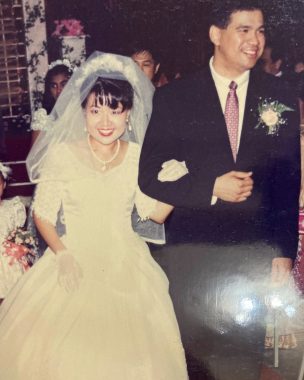In This Passageway of Grief, I Also Find Hope

After nine years of being a caregiver to a husband afflicted with hATTR amyloidosis, I can no longer lay claim to having that role. My beloved husband of 27 years, Aubrey, passed away on May 22.
Even as I write this, I realize that moving forward, I won’t be able to share real-time experiences and insights about being a caregiver anymore. Since my first column on Oct. 28, 2020, I have been writing from a carer’s perspective, telling my readers what it’s like journeying with a spouse with hATTR amyloidosis, a rare, terminal condition.
I’ve written about our struggles, but I’ve also highlighted moments of celebration. During challenges I faced with him, I’d instinctively make a mental note to write about what we’d gone through and what had helped us pull through.
Now that he is no longer around, I find myself missing that part of me. How do I adapt to not being a caregiver anymore after being one for nine years? This identity that has forged itself as part of me now longs for a sense of belonging. That need no longer exists, and I’m seeking direction and guidance in this vacuum. I’m looking for direction to fill the empty space with his dynamic energy that still exists, and guidance through the darkness of grief.
Between the two spaces of purpose and sadness, I’m walking in a corridor of brightness lit by the legacy my late husband left behind. The corridor walls are lined with the essence of his tenacity, perseverance, and resilience throughout his illness. The walls also feature the remarkable life he led before hATTR amyloidosis.
On and on, I walk down this hallway. Some days when I feel strong, I look up and appreciate the memories with him, but when I’m weak, I track my eyes forward, not wanting to recall and revisit.

Jaime and Aubrey on their wedding day in 1995. (Courtesy of Jaime Christmas)
Perhaps this is grief to me. Maybe this is the process of losing a loved one. I get out of bed every morning because I must. I will myself to achieve normalcy and balance in my day because it’s essential. I say a prayer of thanksgiving and appreciation for the blessing of a 27-year marriage because I wouldn’t be the person I am today without it. I keep moving forward because his legacy lives in me, and I owe it to our children to see it through.
So if you are a caregiver reading this, you may one day find yourself in this corridor of uncertainty. Perhaps you already are. No matter where you find yourself, don’t stop. Keep moving.
“If there were no night, we would not appreciate the day, nor could we see the stars and the vastness of the heavens. We must partake of the bitter with the sweet. There is a divine purpose in the adversities we encounter every day. They prepare, they purge, they purify, and thus they bless.” — James E. Faust
Note: FAP News Today is strictly a news and information website about the disease. It does not provide medical advice, diagnosis, or treatment. This content is not intended to be a substitute for professional medical advice, diagnosis, or treatment. Always seek the advice of your physician or other qualified health provider with any questions you may have regarding a medical condition. Never disregard professional medical advice or delay in seeking it because of something you have read on this website. The opinions expressed in this column are not those of FAP News Today or its parent company, Bionews, and are intended to spark discussion about issues pertaining to familial amyloid polyneuropathy.








Cynthia James
I would like to express my sympathy for the loss of your husband. Reading your articles has always been enlightening. My husband is my caregiver, my knight in shining armor. He takes very good care of me and for that I am truly thankful! I will keep you and your family in my thoughts and prayers.